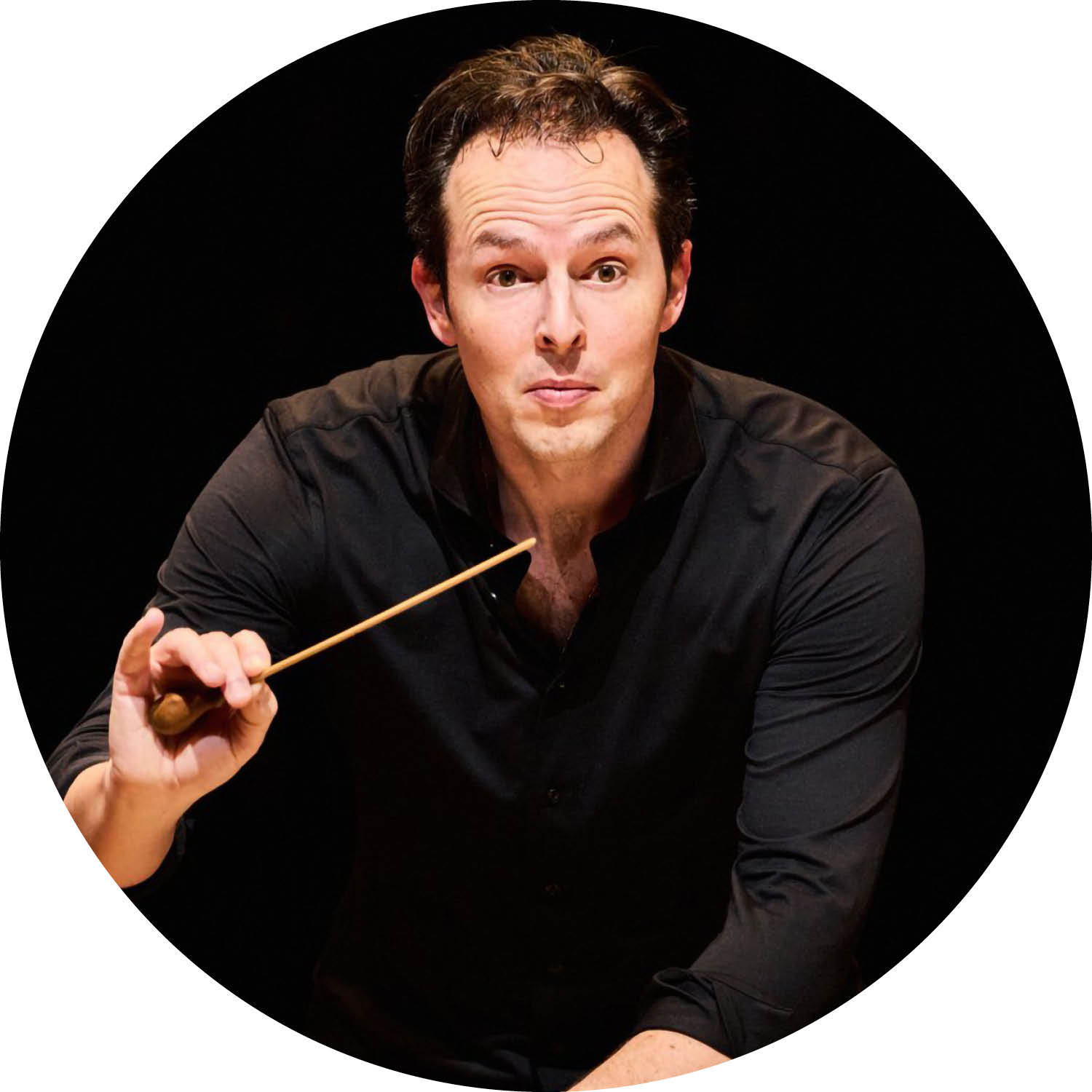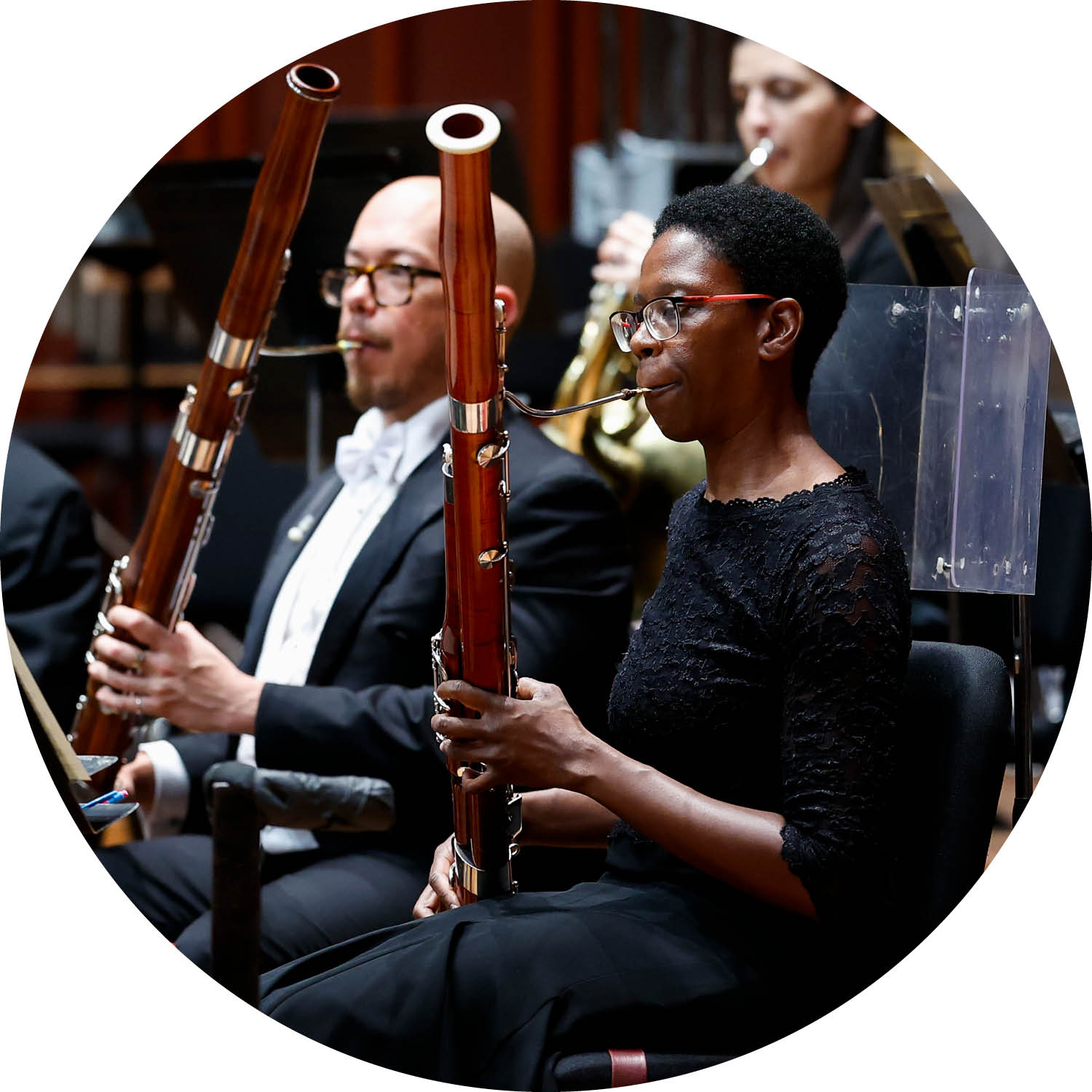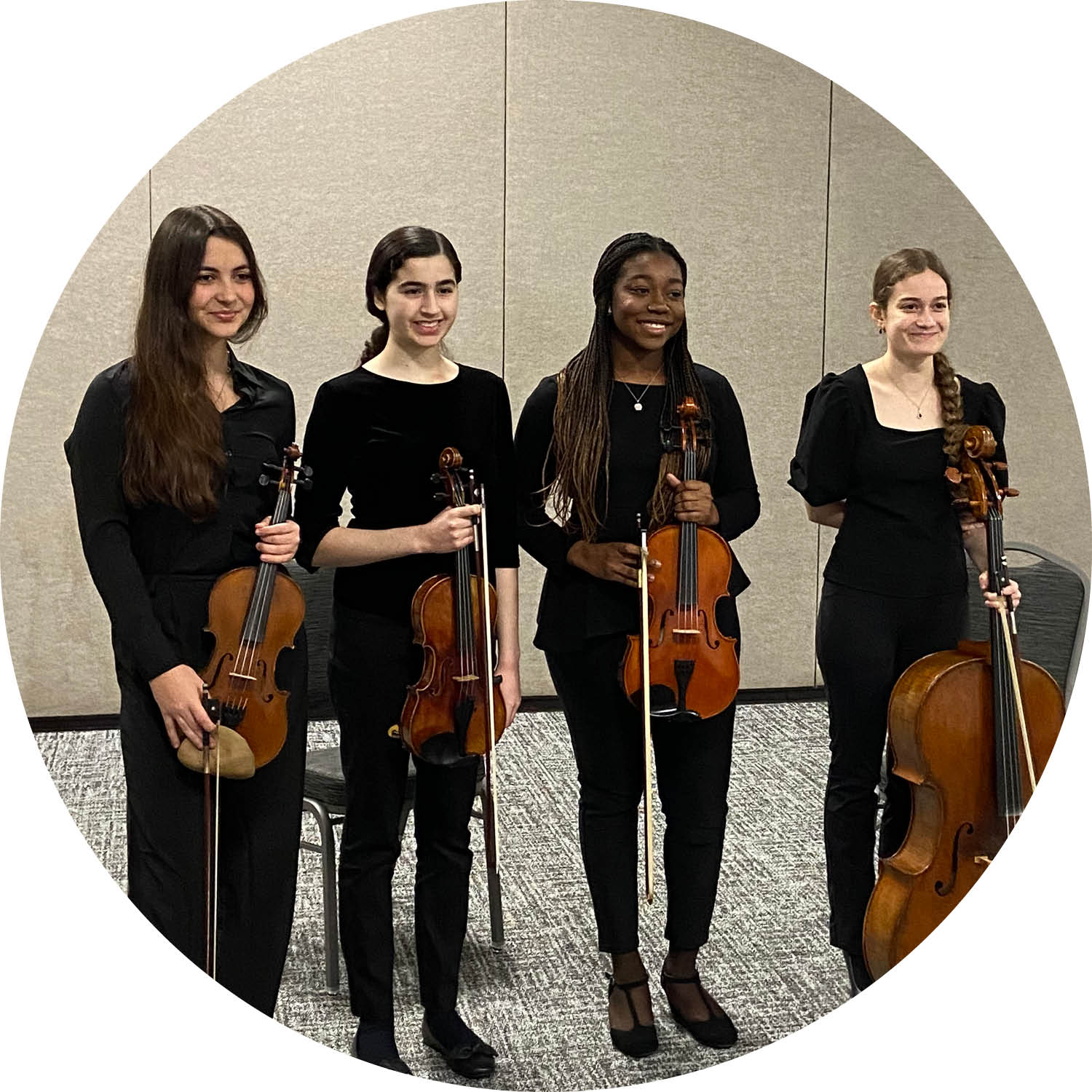
Inside the Opera

With Award-winning Stage Director Gregory Keller
Behind the Baton

Q&A with Acclaimed Conductor Case Scaglione
How did you first become involved in music and conducting? What is your "why" when it comes to music?
"My parents were patrons of the symphony in Houston, which is where I’m from, so we would go to performances time to time. When I started middle school, it was never a question whether I would go into music, rather a question of which instrument I would play. The band director jokingly said he put all his smartest musicians on trombone. So, it made me want to start on that instrument."
Beyond the Barriers

The Jacksonville Symphony Continues to Lead DEI Initiatives
Behind the Bows

JSYO Students Make Significant Strides this Season
Inside the Opera
With Award-winning Stage Director Gregory Keller

On April 12 and 14, the Jacksonville Symphony will be putting on its largest production of the season, its “symphonically-staged” opera, which is Georges Bizet's timeless and cherished Carmen. For those who have not yet seen one of the Symphony’s operas, Jacoby Symphony Hall is transformed into an opera house where the stage is constructed behind the orchestra, complemented by 30-foot screens onto which we project captivating "sets." The anticipation builds even before the music starts, with the orchestra positioned on stage rather than in a pit, making them an integral and visible part of the dramatic unfolding.
This season’s production also features a world-class cast of vocalists including Avery Amereau as Carmen, Eric Taylor as Don José, Sylvia D’eramo as Micaëla, Hunter Enoch as Escamillo, Scott Conner as Zuniga, John Daugherty as Moralès, Brittany Fouché as Frasquita, Katherine Kincaid as Mercédès, James Hall as Le Remendado, John Daugherty as Le Dancaïre, the Jacksonville Symphony Chorus and students from The Bolles School. Many of these singers come from the Metropolitan Opera and other esteemed operatic houses and have garnered top awards from across the globe.
The story of Carmen has captivated audiences for centuries with its drama, allure and emotion. Bizet, in his 1875 opéra-comique, ingeniously wove the captivating story of Carmen, drawing inspiration from Prosper Mérimée's little-known novella. Mérimée, in turn, based Carmen on a firsthand account from the Countess de Montijo during a visit to Spain in 1830. However, Mérimée, a linguist, transformed the Balkan girl in the original story into a more exotic character, a Basque "gypsy." Carmen, as envisioned by Bizet, robs a soldier, Don José Navarro, and convinces him to assist her escape from jail. After being court-martialed and released from the brig, he runs back to her, joins her band of thieves and lives a life of freedom. However, he soon commits multiple murders and assumes control of the Roma gang. When Carmen leaves Don José for a famous toreador, he takes her life and lovingly buries her body in her favorite spot in the forest. From start to finish, the opera unfolds into a tale of love, jealousy and murder, with Carmen's mysterious and elusive nature taking center stage.
Carmen's character becomes a complex reflection within Mérimée's story, narrated by a French linguist encountering a mysterious thief, who turns out to be Don José. Bizet's version accentuates Carmen's enigmatic aura, with the protagonist revealing little about herself. She becomes a symbolic house of mirrors, disorienting and destroying those who attempt to unravel her mystery, while those who appreciate her as she authentically is remain unharmed. Bizet unknowingly created a character who turned into a cultural icon transcending time and boundaries.
Delving deeper into the history of the opera, Bizet's Carmen faced initial struggles despite Bizet being awarded the prestigious Prix de Rome in music. His librettists Ludovic Halévy and Henri Meilhac secured a commission at the Opéra Comique, where rehearsals encountered challenges. Orchestra members complained that some of the music was unplayable, and singers objected to having to dance and smoke while singing, preferring instead to stand still and face front. There were so many revisions to the score and libretto that to this day, there remains no definitive version. Each iteration of Carmen must be reconstructed and reimagined. Some use spoken dialogue while others have sung recitatives between the musical numbers. The score remains as mutable and elusive as Carmen herself.
Controversy also brewed over presenting such a risqué story at a "family" theatre, leading to revisions and debates among directors. The premiere initially faced harsh criticism, but over time, Carmen emerged as a masterpiece celebrated by composers like Pyotr Ilyich Tchaikovsky. Shortly after its premiere, Bizet died at 36 years old from two consecutive heart attacks, having no idea that he had unleashed a character that would challenge the world to this day.
Reimagining Carmen for each era remains crucial, ensuring that we portray her as true to herself. Her unwavering honesty, starkly contrasted with male counterparts like Don José, defies societal norms. Carmen's unkillable truth has led to her various incarnations in literature, film, pop culture and present-day artists like Madonna, Beyoncé and Lady Gaga. Bizet hit on a taboo so deeply entrenched in our culture that his Carmen continues to resonate through time and space. As long as one man is threatened by Carmen’s unvarnished truth, this masterpiece will continue to shock and challenge audiences, just as it did on that chilly March night in Paris, 151 years ago.
To experience this must-see season highlight, only buy tickets at JaxSymphony.org.
Behind the Baton
Q&A with Acclaimed Conductor Case Scaglione

How did you first become involved in music and conducting? What is your "why" when it comes to music?
“My parents were patrons of the symphony in Houston, which is where I’m from, so we would go to performances time to time. When I started middle school, it was never a question whether I would go into music, rather a question of which instrument I would play. The band director jokingly said he put all his smartest musicians on trombone. So, it made me want to start on that instrument. I had a wonderful teacher who introduced me to Gustav Mahler, and then I wanted to see how the sounds in his music were made. Around 13 or 14, I ordered many different scores to look through, which is how I became familiar with the musical language. I was bitten by the bug and fell in love with conducting, developing a deep affinity for this art. At that point, I had a feeling this would keep me occupied for the rest of my life.
As for my why, it's a mixture of the two things I love. It’s a combination of scholarship and getting to learn and study all the time, and the payoff is I get to share it with people. Music is such a performative art, and it’s dependent on us coming together and interpreting it. Otherwise, it doesn't exist. To participate in the art of its interpretation is such a pleasure.”
What are your current and future aspirations as a musician and conductor?
“I hope to become more insightful about the music I am performing. My ultimate goal is to understand my craft better and become more fluent and adept at sharing it with people. I also want to be more empathetic and to understand more of what musicians need from me. That’s the job of being a conductor, to help musicians become the best versions of themselves. I hope that continues and that I never close myself off to the idea that there is a wealth of knowledge to unlock. I always want to keep the beginners mind, as Buddhists believe.”
Where do you draw inspiration to breathe new energy into the same works time after time?
“The inspiration comes from the experience of being human, the pains and joys of living in the world. There is the belief that music simply exists the way it is on the page. However, I believe there is a human dimension to music and the idea that there is no music without an interpreter. For the most fastidious of composers like Mahler or Ludwig van Beethoven, the notes on the page themselves come nowhere near to capturing the magnificence of their works. Our interpretations of music change as we change. These changes happen not only on any individual level but as a society, acting as a commentary on the evolving human experience and political spectrums. Our interpretations are mirror images of us, across generations over time.”
How would you describe the power of Ottorino Respighi’s Pines and Fountains of Rome?
“The amazing thing about these pieces is Respighi gives us such a strong sense of time and place in Italy. These pieces are a testament to music’s power of transporting us to other settings. They allow us to taste, feel and fully sense these places and the people and landscapes within them. They are so evocative in their imagery and where these pieces were born.”
How would you describe your overall conducting style?
“I believe that, essentially, the role of a conductor is to navigate what the musicians need from me. Conductors don’t make any sound. We are coaches, and we are here to offer guidance and a bird’s eye view as to what is taking place in a piece. The extent to which a concert can be world class is the extent to how a conductor assists musicians with being the best versions of themselves without getting in the way. Orchestras can play without conductors, but in order to play in a coherent way, a conductor is needed. It is always a balancing act that conductors must perform.”
What should audiences pay close attention to in these performances?
“I would pay close attention to what a great orchestrator Respighi is. It is up to the composer to choose which instruments and sounds to employ, and it clear how masterly constructed these pieces are. As I mentioned, they are so evocative of Italy. It is so beautifully composed, it’s like gold burnishing inside of a cathedral. All of the musical voices coming together, and all the orchestral color is truly something to marvel at.”
What else didn’t we cover that you would like to tell our audiences?
“I'm really thrilled to spend time with the Jacksonville Symphony and bask in the glory of this music for a week. It’s going to be great, and I look forward to coming to Jacksonville!”
Beyond the Barriers
The Jacksonville Symphony Continues to Lead DEI Initiatives

A fundamental part of the Jacksonville Symphony's mission is to ensure the accessibility of musical opportunities for all, driven by robust Diversity, Equity and Inclusion (DEI) initiatives. The Symphony's has established a Strategic Plan, setting an ambitious agenda through June 2026, that outlines goals for growth in these three areas. As part of its DEI Strategy, the Symphony aims to diversify its concert audiences and recruit and retain musicians from diverse backgrounds and experiences. Collaborating with the Sphinx Organization, based in Detroit, Michigan, which strives to "transform lives through the power of diversity in the arts," the Symphony is working towards creating an orchestra reflective of the community it serves. It continues to be a leading partner of Sphinx in hiring musicians for one-year positions and multiple short-term engagements.
In the 2023/24 Season, the Symphony has welcomed several Sphinx musicians to Jacoby Symphony Hall: full-season musicians Romona Merritt and Maya Stone and substitute musicians Isaac Fernandez Hernandez, Carlos Lozano, Mwakudua waNgure, Dana Dominguez, Gabriela Peña and Sandro Leal-Santiesteban.
Last season, the Jacksonville Symphony received a competitive two-year, $200,000 grant from the Jessie Ball duPont Fund to enhance racial diversity within the orchestra. Additionally, the Symphony strengthens its commitment to DEI initiatives through a three-year, $75,000 Catalyst Fund Incubator Grant from The League of American Orchestras, generously supported by The Andrew W. Mellon Foundation and the Paul M. Angell Family Foundation.
The Jacksonville Symphony was recently featured in a case study on Diversity, Equity and Inclusion by the League of American Orchestras. The study focused on the Symphony in 60 Series, demonstrating how these dynamic concerts showcase shorter works than those in the Florida Blue Classical Series. Priced affordably, these concerts appeal to younger first-time attendees and regular patrons seeking a fresh musical experience by offering an accessible way to learn more about classical music. The series also serves as an ideal platform for engaging social media influencers.
The case study further delved into the Chase Jazz Series, featuring the local Jacksonville Jazz Collective (JJC) and national, award-winning artists like Terence Blanchard. Jacksonville held an important place in the early years of jazz and has since become deeply embedded in the city’s musical culture. Curated by Principal Tuba James Jenkins, who also directs the JJC, this series reflects the Jacksonville Symphony's commitment to being a musical vehicle for the entire community, offering a diverse range of musical genres, including jazz, in its extensive lineup.
Additionally, Dr. Marianne Rice, Lory Doolittle Endowed Vice President of Music Education & DEI Initiatives, and Blake Schlabach, Vice President and General Manager, recently attended the Sphinx Connect 2024 Amplify Conference in Detroit, Michigan. During the conference, Rice and Schlabach attended sessions that discussed diversity within the orchestra and staff.
“Attending the Sphinx Connect 2024 Conference was another great opportunity for the Jacksonville Symphony to share ideas about Diversity, Equity and Inclusion,” said Rice.
“The Sphinx Connect 2024 Conference presented a myriad of ways that the Jacksonville Symphony and other orchestras can connect and integrate Diversity, Equity and Inclusion into all aspects of our organizations and the communities that we live in,” said Schlabach.
All in all, the Symphony is committed to fostering a culture that values and embraces Diversity, Equity and Inclusion and is proud to be a leading organization in furthering these initiatives, paving the way for a bright future ahead.
Behind the Bows
JSYO Students Make Significant Strides this Season

With five performances, numerous rehearsals and over 230 young musicians from all over Northeast Florida, the Jacksonville Symphony Youth Orchestras (JSYO) have been celebrating a successful 2023/24 Season. Most recently, on January 12, 2024, four high-school students from the JSYO performed in a massive celebration of Martin Luther King Jr. Day, presented by the City of Jacksonville, for the first time ever. This diverse quartet consisted of violinist Leila Warren, violinist Annelise Ossi, violist Janel Neil-Blake and cellist Madison Tedder. Taking place at The Prime F. Osborn III Convention Center, the students performed Louis Armstrong’s “What a Wonderful World” in front of over 2,000 audience members, garnering uproarious applause. Join us in giving a proud congratulations to these stellar students!
Next up on April 29, JSYO will have its Festival of Strings performance where over 300 young musicians will perform on stage, including 100 students from 10 Duval Country Title I schools joining the Jump Start Strings Ensemble. Made possible by the Symphony’s partnership with Communities In Schools, the Jump Start Strings After School Program gives students in select Duval County Title I schools free instruments, music books and instruction by Symphony musicians each week, with the ultimate goal to prepare them to perform in this concert with the JSYO and to audition for LaVilla School of the Arts. Reserve your tickets today for this special performance at https://my.jaxsymphony.org/jsyo23-24/3476.

